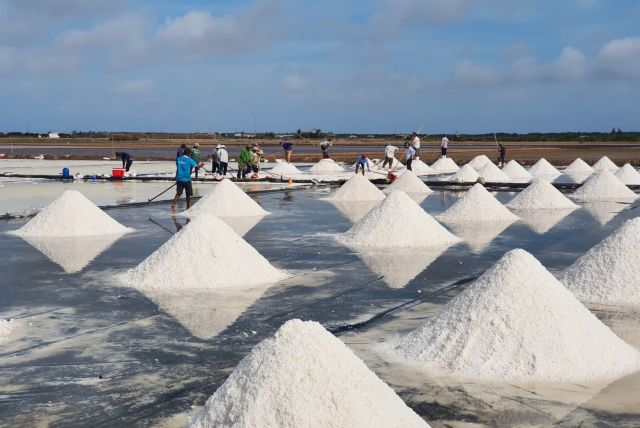Bạc Liêu Province has taken efforts to develop more products under the national “One Commune-One Product” programme and promote their sales to increase rural incomes.

Bạc Liêu Province has made efforts to develop more products under the national “One Commune-One Product” programme and promote their sales to increase rural incomes.
Four years after starting the programme, the Cửu Long (Mekong) Delta province has 130 OCOP products, 33 of them four-star and 97 three-star under a five-star rating system.
Its OCOP products include frozen shrimp, salt-related products and processed shrimp, fish and squid, are sold in supermarkets nationwide and exported to the US, Japan, the EU, and other foreign markets.
The province’s OCOP products include some popular tourist destinations.
Đăng Minh Pháp, head of the province Rural Development Sub-department, said local products had improved their value and expanded markets after OCOP recognition.
OCOP status increased sales by 10-20 per cent, he said.
The province provided support to many producers seeking to invest in production machinery and facilities to improve OCOP quality, and helped design product logos and packaging to make them attractive to consumers.
The province Department of Industry and Trade introduced local speciality and OCOP products at 18 fairs organised in other provinces and cities in 2021-23.
It helped OCOP makers participate in exhibitions and fairs by subsidising half their booth rents and transport costs.
It also assisted their participation in conferences for linking up buyers and sellers held in Bạc Liêu and other provinces and cities, and lent a hand to companies and co-operatives seeking to set up websites to promote their OCOP items.
Companies, cooperatives and establishments that make these products have stepped up investment in production facilities to diversify and meet market demand.
The Bạc Liêu Salt Joint Stock Company in Vĩnh Lợi District makes various products from salt and has obtained four-star OCOP status for seven of them: refined, iodized, granular, shrimp, chilli, pepper, and vegetarian salts.
Its products are sold nationwide and exported to markets with high quality requirements such as South Korea and Japan.
It exported more than 1,600 tonnes of refined and granular salts to South Korea last year, up 35 per cent from 2021.
Phương Nguyệt in Giá Rai Town makes four products (dried shrimp, mudskipper and gourami fish and shrimp paste) with OCOP status, and they are sold in many provinces and cities, including HCM City.
Nguyễn Nguyệt Ánh, its owner, said to promote her products she often participated in exhibitions, fairs and buyers-sellers meetings held in Bạc Liêu and elsewhere.
“Besides traditional distribution channels, my establishment also sells products on e-commerce platforms.”
Lê Tấn Cận, deputy standing chairman of the province People’s Committee, said the programme was meant to develop the rural economy by promoting its strengths and increasing product value.
The province planned to develop branded OCOP items and value chains based on the strengths and advantages of locally available raw materials, he said.
This would help increase local incomes, restructure agriculture in combination with developing small industry, rural occupations, services, and tourism, he added.
But there were still hurdles to implementing the programme as most OCOPs are made manually on a household scale and have low competitiveness.
Many were not sold widely despite being in great demand among both locals and tourists because of poor promotion.
To develop OCOP, the province would address this, strengthening promotion through participation in fairs and exhibitions at home and abroad, advertising OCOP items on the media and online, and opening showrooms for them.
It would develop linkages between various stakeholders in the OCOP supply chain, and co-operate with other provinces and cities to sell the products. — VNS





